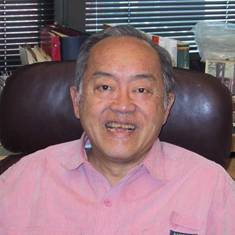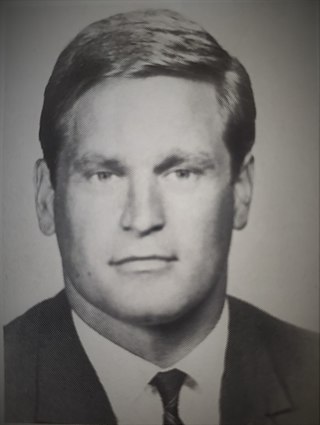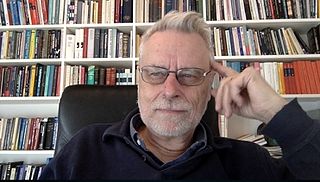Related Research Articles

Mathematical optimization or mathematical programming is the selection of a best element, with regard to some criterion, from some set of available alternatives. It is generally divided into two subfields: discrete optimization and continuous optimization. Optimization problems arise in all quantitative disciplines from computer science and engineering to operations research and economics, and the development of solution methods has been of interest in mathematics for centuries.
Model predictive control (MPC) is an advanced method of process control that is used to control a process while satisfying a set of constraints. It has been in use in the process industries in chemical plants and oil refineries since the 1980s. In recent years it has also been used in power system balancing models and in power electronics. Model predictive controllers rely on dynamic models of the process, most often linear empirical models obtained by system identification. The main advantage of MPC is the fact that it allows the current timeslot to be optimized, while keeping future timeslots in account. This is achieved by optimizing a finite time-horizon, but only implementing the current timeslot and then optimizing again, repeatedly, thus differing from a linear–quadratic regulator (LQR). Also MPC has the ability to anticipate future events and can take control actions accordingly. PID controllers do not have this predictive ability. MPC is nearly universally implemented as a digital control, although there is research into achieving faster response times with specially designed analog circuitry.
Trajectory optimization is the process of designing a trajectory that minimizes some measure of performance while satisfying a set of constraints. Generally speaking, trajectory optimization is a technique for computing an open-loop solution to an optimal control problem. It is often used for systems where computing the full closed-loop solution is not required, impractical or impossible. If a trajectory optimization problem can be solved at a rate given by the inverse of the Lipschitz constant, then it can be used iteratively to generate a closed-loop solution in the sense of Caratheodory. If only the first step of the trajectory is executed for an infinite-horizon problem, then this is known as Model Predictive Control (MPC).
The Gauss pseudospectral method (GPM), one of many topics named after Carl Friedrich Gauss, is a direct transcription method for discretizing a continuous optimal control problem into a nonlinear program (NLP). The Gauss pseudospectral method differs from several other pseudospectral methods in that the dynamics are not collocated at either endpoint of the time interval. This collocation, in conjunction with the proper approximation to the costate, leads to a set of KKT conditions that are identical to the discretized form of the first-order optimality conditions. This equivalence between the KKT conditions and the discretized first-order optimality conditions leads to an accurate costate estimate using the KKT multipliers of the NLP.
Pseudospectral optimal control is a joint theoretical-computational method for solving optimal control problems. It combines pseudospectral (PS) theory with optimal control theory to produce a PS optimal control theory. PS optimal control theory has been used in ground and flight systems in military and industrial applications. The techniques have been extensively used to solve a wide range of problems such as those arising in UAV trajectory generation, missile guidance, control of robotic arms, vibration damping, lunar guidance, magnetic control, swing-up and stabilization of an inverted pendulum, orbit transfers, tether libration control, ascent guidance and quantum control.

Yu-Chi "Larry" Ho is a Chinese-American mathematician, control theorist, and a professor at the School of Engineering and Applied Sciences, Harvard University.
Miroslav Krstić is an American control theorist and Distinguished Professor of Mechanical and Aerospace Engineering at the University of California, San Diego (UCSD). Krstić is also the director of the Center for Control Systems and Dynamics at UCSD and a Senior Associate Vice Chancellor for Research. In the list of eminent researchers in systems and control, he is the youngest.
Richard D. Braatz is the Edwin R. Gilliland Professor at the Massachusetts Institute of Technology known for his research in control theory and its applications to chemical, pharmaceutical, and materials systems.

Dimitri Panteli Bertsekas is an applied mathematician, electrical engineer, and computer scientist, a McAfee Professor at the Department of Electrical Engineering and Computer Science in School of Engineering at the Massachusetts Institute of Technology (MIT), Cambridge, Massachusetts, and also a Fulton Professor of Computational Decision Making at Arizona State University, Tempe.
The scenario approach or scenario optimization approach is a technique for obtaining solutions to robust optimization and chance-constrained optimization problems based on a sample of the constraints. It also relates to inductive reasoning in modeling and decision-making. The technique has existed for decades as a heuristic approach and has more recently been given a systematic theoretical foundation.

Dragoslav D. Šiljak is professor emeritus of Electrical Engineering at Santa Clara University, where he held the title of Benjamin and Mae Swig University Professor. He is best known for developing the mathematical theory and methods for control of complex dynamic systems characterized by large-scale, information structure constraints and uncertainty.

Anders Gunnar Lindquist is a Swedish applied mathematician and control theorist. He has made contributions to the theory of partial realization, stochastic modeling, estimation and control, and moment problems in systems and control. In particular, he is known for the discovery of the fast filtering algorithms for (discrete-time) Kalman filtering in the early 1970s, and his seminal work on the separation principle of stochastic optimal control and, in collaborations with Giorgio Picci, the Geometric Theory for Stochastic Realization. Together with late Christopher I. Byrnes and Tryphon T. Georgiou, he is one of the founder of the so-called Byrnes-Georgiou-Lindquist school. They pioneered a new moment-based approach for the solution of control and estimation problems with complexity constraints.
Isaac Michael Ross is a Distinguished Professor and Program Director of Control and Optimization at the Naval Postgraduate School in Monterey, CA. He has published a highly-regarded textbook on optimal control theory and seminal papers in pseudospectral optimal control theory, energy-sink theory, the optimization and deflection of near-Earth asteroids and comets, robotics, attitude dynamics and control, orbital mechanics, real-time optimal control, unscented optimal control and continuous optimization. The Kang–Ross–Gong theorem, Ross' π lemma, Ross' time constant, the Ross–Fahroo lemma, and the Ross–Fahroo pseudospectral method are all named after him. According to a report published by Stanford University, Ross is one of the world's top 2% of scientists.

Wassim Michael Haddad is a Lebanese-Greek-American applied mathematician, scientist, and engineer, with research specialization in the areas of dynamical systems and control. His research has led to fundamental breakthroughs in applied mathematics, thermodynamics, stability theory, robust control, dynamical system theory, and neuroscience. Professor Haddad is a member of the faculty of the School of Aerospace Engineering at Georgia Institute of Technology, where he holds the rank of Professor and Chair of the Flight Mechanics and Control Discipline. Dr. Haddad is a member of the Academy of Nonlinear SciencesArchived 2016-03-04 at the Wayback Machine for recognition of paramount contributions to the fields of nonlinear stability theory, nonlinear dynamical systems, and nonlinear control and an IEEE Fellow for contributions to robust, nonlinear, and hybrid control systems.
GPOPS-II is a general-purpose MATLAB software for solving continuous optimal control problems using hp-adaptive Gaussian quadrature collocation and sparse nonlinear programming. The acronym GPOPS stands for "General Purpose OPtimal Control Software", and the Roman numeral "II" refers to the fact that GPOPS-II is the second software of its type.
Ji-Feng Zhang was born in Shandong, China. He is currently the vice-chair of the technical board of the International Federation of Automatic Control (IFAC), the vice-president of the Systems Engineering Society of China (SESC), the vice-president of the Chinese Association of Automation (CAA), the chair of the technical committee on Control Theory (CAA), and the editor-in-chief for both All About Systems and Control and the Journal of Systems Science and Mathematical Sciences.
Vivek Shripad Borkar is an Indian electrical engineer, mathematician and an Institute chair professor at the Indian Institute of Technology, Mumbai. He is known for introducing analytical paradigm in stochastic optimal control processes and is an elected fellow of all the three major Indian science academies viz. the Indian Academy of Sciences, Indian National Science Academy and the National Academy of Sciences, India. He also holds elected fellowships of The World Academy of Sciences, Institute of Electrical and Electronics Engineers, Indian National Academy of Engineering and the American Mathematical Society. The Council of Scientific and Industrial Research, the apex agency of the Government of India for scientific research, awarded him the Shanti Swarup Bhatnagar Prize for Science and Technology, one of the highest Indian science awards for his contributions to Engineering Sciences in 1992. He received the TWAS Prize of the World Academy of Sciences in 2009.
Frank L. Lewis is an American electrical engineer, academic and researcher. He is a professor of electrical engineering, Moncrief-O’Donnell Endowed Chair, and head of Advanced Controls and Sensors Group at The University of Texas at Arlington (UTA). He is a member of UTA Academy of Distinguished Teachers and a charter member of UTA Academy of Distinguished Scholars.
Maamar Bettayeb is a control theorist, educator and inventor. He is the author of publications on understanding the singular value decomposition and model order reduction. Bettayeb is also a promoter of scientific research.
Hassan K. Khalil is an Egyptian-born American electrical engineer. He was named Fellow of the Institute of Electrical and Electronics Engineers (IEEE) in 1989 for contributions to singular perturbation theory and its application to control.
References
- 1 2 "List of Fellows". Royal Academy of Engineering. Archived from the original on 21 May 2020. Retrieved 21 April 2018.
- 1 2 3 4 5 Parisini, Thomas; Astolfi, Alessandro (10 June 2024). "Professor David Q Mayne FREng FRS 1930 - 2024". Imperial College London news. Retrieved 14 June 2024.
- ↑ "David Mayne". The Mathematics Genealogy Project. Retrieved 9 September 2022.
- 1 2 Knoesen, André (6 June 2024). "In Memory of Professor Emeritus David Q. Mayne". University of California, Davis . Retrieved 14 June 2024.
- ↑ "IEEE Control Systems Award Recipients" (PDF). IEEE . Retrieved 30 March 2011.
- ↑ "IEEE Control Systems Award". IEEE Control Systems Society. Archived from the original on 29 December 2010. Retrieved 30 March 2011.